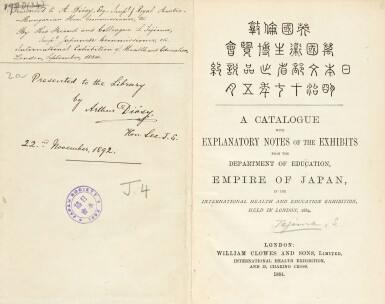
Property from the Japan Society Library, London
A group of books by or presented to the Japan Society Library, by Arthur Diósy
Lot Closed
November 4, 02:01 PM GMT
Estimate
2,500 - 3,000 GBP
Lot Details
Description
Property from the Japan Society Library, London
A group of books by or presented to the Japan Society Library, by Arthur Diósy
comprising:
Arthur Diósy, Harmsworth history of the world: Japan (n. p., 1908), presented by Arthur Diósy on 19 June 1908
Arthur Diósy, New Far East (London: Cassell and Company Ltd., 1898), donated by the author in 1898
Arthur Diósy, Report of an Illustrated Address on ‘Russia and Japan’ (London: McCorquodale and Company, 1904)
Clarence Ludlow Brownell, Tales from Tokio (New York: Quail & Warner, 1900)
Augustus Henry Mounsey, The Satsuma Rebellion. An Episode of Japanese History (London: John Murray, 1879), donated by Arthur Diósy on 22 November 1892
David Murray, Japan: the story of the nations (London: T. Fisher Unwin, 1894), donated by Arthur Diósy on 1894
Eugene Stock, Japan & the Japanese Mission (London: Church Missionary Society/Seeley, Jackson & Halliday, 1887), donated by Mrs Diósy on July 1893 (see images 4, 5, 6)
Henry Arthur Tilley, Japan: the Amoor and the Pacific (1858-1860) (London: Smith, Elder and Co., 1861)
Japan Dept of Education, Japanese Education at the International Health Exhibition: A Catalogue with Explanatory Notes of the Exhibits from the Department of Education, Empire of Japan (London: William Clowes and Sons Limited, 1884), donated by Arthur Diósy on 22 November 1892 (see image 1)
John R. Black, Young Japan: Yokohama & Yedo. vols. 1-2 (London/Yokohama: Trubner & Co./Kelly & Co., 1880), donated by Arthur Diósy in October 1893
Kenchio Suyematsu, A fantasy of far Japan (London: Archibald Constable, 1905), presented by Suyematsu Kenchio to Arthur Diósy
Léon van der Polder, De cultuur der bamboe in Japan [in Dutch] (Amsterdam: Koloniaal Museum te Haarlem, 1894), donated by Arthur Diósy on 27 September 1897
Michinori Nagasaki, Womens Education: their social privileges and civil rights in Japan (London, 1877), donated by Arthur Diósy
Percival Lowell, Noto: an unexplored corner of Japan (Houghton, Mifflin and Company/Riverside Press, 1891), donated by Arthur Diósy on August 1893
Shimbei Kobayashi, Ei-wa tsuiyaku jisho [English-Japanese dictionary] (Tokyo, 1872), presented to Arthur Diósy
Thomas R. H. McClatchie, Japanese plays (London: W. H. Allen & Co., 1890), presented to Arthur Diósy in May 1893
Vasily Golownin, Japan and the Japanese: Comprising the Narrative of a Captivity in Japan and an Account of British Commercial Intercourse with that Country, vols. 1-2 (London: Colburn and Co., 1818)
Vasily Golownin, Recollections of Japan (London: Henry Colburn, 1819) donated by Arthur Diósy
William Dalton, William Adams: The first Englishman in Japan (London: James Blackwood & Co., 1894)
Arthur Diósy (1856 - 1923), the founder of The Japan Society London, was one of the key figures that contributed to the establishment and development of Anglo-Japanese relations and the Society and its historical library.
Diósy was born on the 6th of June 1856, in London and was educated at home by his father during his childhood due to poor health. This allowed him to explore different interests and develop his deep passion for foreign languages (see catalogue notes above). He became fluent in English, Japanese, Hungarian, French, German, Italian, and Spanish, and learned Dutch and Portuguese. His lifelong interest in Asia began at the age of ten while he was reading a book in French on China. He proceeded to invest his time in learning Dutch and Portuguese, main traders with Japan at the time, in order to expand his knowledge of the country and its culture.1 He composed a Chinese-French-English dictionary and self-studied Japanese. In 1867 he had the chance to meet some Japanese peers for the first time at a theatre performance which furthered his passion for the land of the rising sun. In 1868 he entered the London International College, an early attempt at international education and in 1871 he moved to Germany and attended high school in Lippstadt and Düsseldorf. Upon his return, he enlisted in the Naval Artillery, where he trained from 1875 to 1882.
On the 9th of September 1891, Diósy founded The Japan Society London during the International Congress of Orientalists with the mission to establish a society for the encouragement of Japanese studies and to bring together all those in the United Kingdom, and throughout the world, interested in Japanese matters. In 1894, his commitment was recognised and he was awarded the Third Order of the Rising Sun from Japan. After the Sino-Japanese War, interest in Japan increased in Britain, and Diósy gave lectures on Japan in various places. In 1898 he published The New Far East (see this lot item 2), which was well-received and its publication continued through several editions.
In 1899, Diósy visited Japan for the first time. During his stay, he travelled around Tokyo, Nagoya, Kyoto, Nara, Osaka, Kobe, Miyajima, and Etajima and the Emperor Meiji received him in recognition of his effort in the establishment of The Japan Society. From 1901 to 1904 he chaired The Japan Society London, deepening Anglo-Japanese relationships on political, social, and cultural levels. The Society kept close ties with the Japanese Imperial Crown, welcoming the Japanese Crown Prince Hirohito (later Emperor Showa) when he visited England.]
1. Shimbei Kobayashi, Ei-wa tsuiyaku jisho [English-Japanese dictionary] (Tokyo, 1872) has an inscription on the title page that reads: "Presented to A. Diósy by R. N.A.V.Y.J.J... STUDENT OF OUR LANGUAGE December 25th 1877 with Tadanoboo Ogasawara's compliments, Hoping that he will succeed in learning our language in one month's time [additional text in katakana reads] Shinsetu-na-tomodachi (a kind friend's) [...] Shiiyama Hikari-kun (see image 8). This indicates that Diósy was studying the Japanese language from an early age.
You May Also Like










